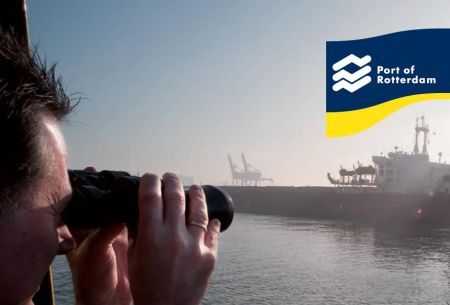
Despite the ailing economy, freight throughput in the port of Rotterdam grew by 1.7% in 2012. A total of 442 million tonnes of cargo went through the port.
Hans Smits, President and CEO of the Port of Rotterdam Authority: “Although the growth is limited, it is another record for Rotterdam. Container throughput increased slightly in 2012, thanks especially to exports. In the dry bulk market segment, the declining steel production in Europe was responsible for reduced throughput, especially of ore. This shift was more than compensated by the growth in liquid bulk: more crude oil and oil products particularly were handled. The latter category has actually tripled in size over the past ten years. That shows that the port of Rotterdam is increasingly becoming a hub for global trade. This helps the port to continue to grow, as global trade generally develops faster than the Dutch and the European economies. The positive throughput figures for this year do not alter the fact that the profit margins for many companies are under pressure, some businesses are in the red and some are dismissing staff.” The Port of Rotterdam Authority expects growth of around 2% next year.
Dry bulk
In dry bulk, less cargo was handled across the board. Bad harvests in major grain and oil seed exporting countries and the ensuing high prices caused agribulk throughput to drop by 18%. Iron ore and scrap dropped 12% due to the low steel production in Europe. Several blast furnaces have closed. Throughput of cokes coal (used in blast furnaces) did not keep pace with the drop in iron ore handling, because cargo flows were bundled and now go via the port of Rotterdam. Cokes coal throughput dropped nevertheless by 4%. The causes are the reduced demand for coal for electricity generation due to the availability of plenty of sustainable energy in the summer and stocks being used up. Throughput of other dry bulk dropped by 9%, due especially to the slump in building and disappointing industrial production. A total of 79 million tonnes of dry bulk was handled.
Liquid bulk
The throughput of crude oil increased this year by 6%, putting it back at the ‘normal’ level. On the one hand the refinery sector experienced fewer significant maintenance breaks than last year and on the other hand production capacity ceased elsewhere in Europe, a reason why production here was driven up.
Similar to previous years, the throughput of mineral oil products increased, this time by 12%. The most important cause is the increased oil product trade, due chiefly to the differences in the price of fuel oil in Europe and Asia. It is worthwhile, for instance, to ship Russian fuel oil via the port of Rotterdam to the Far East. The throughput of naphtha, gas oil, diesel, kerosene and petrol also increased.
LNG imports remained at a low level, because the prices in Asia are much higher, resulting in the product being transported to the Far East rather than to Europe.
Other liquid bulk experienced growth of 4%, partly through the start-up of Neste (palm oil import) and the increased import of bio diesel. A total of 214 million tonnes of liquid bulk was handled. This cargo segment thus represents half of the cargo throughput in the port of Rotterdam.
Containers and breakbulk
The continuing economic slump means less cargo is imported and more is exported. The balance of those two is a growth of 2% in tonnage. Because export containers are heavier on average and furthermore, fewer containers were going back empty, the throughput in numbers of containers (TEU) stayed the same. The port of Rotterdam lost cargo in the feeder market, but gained short sea containers. The 11.9 million TEU in containers came to 126 million tonnes.
Roll on/roll off increased by 3%, despite the ailing British economy. Other general cargo dropped by 23%, due especially to the greatly reduced import of steel. This brings breakbulk to a total of -5% with 24 million tonnes.
Market share
The market share of the port of Rotterdam in the Hamburg-Le Havre range increased over the past five years by an average of 0.5 percentage points per year to 37.7% in the third quarter of 2012. The difference with Hamburg and Antwerp in the container segment which arose in 2009 was preserved.
Expectations for 2013
In view of the prospects of the development of the Dutch and European, and especially the German economies, modest growth of around 2% is expected again for 2013. This means that the throughput for next year will probably approach 450 million tonnes.
The throughput is expected to increase slightly faster in the subsequent years, on the one hand, because the economic prospects for 2014 are better and on the other hand, because the current investments in tank storage, container terminals and coal-fired power plants will result in more throughput over time.
We use cookies to improve your experience. By continuing to use our site, you accept our Cookies, Privacy Policy,Terms and Conditions. Close X